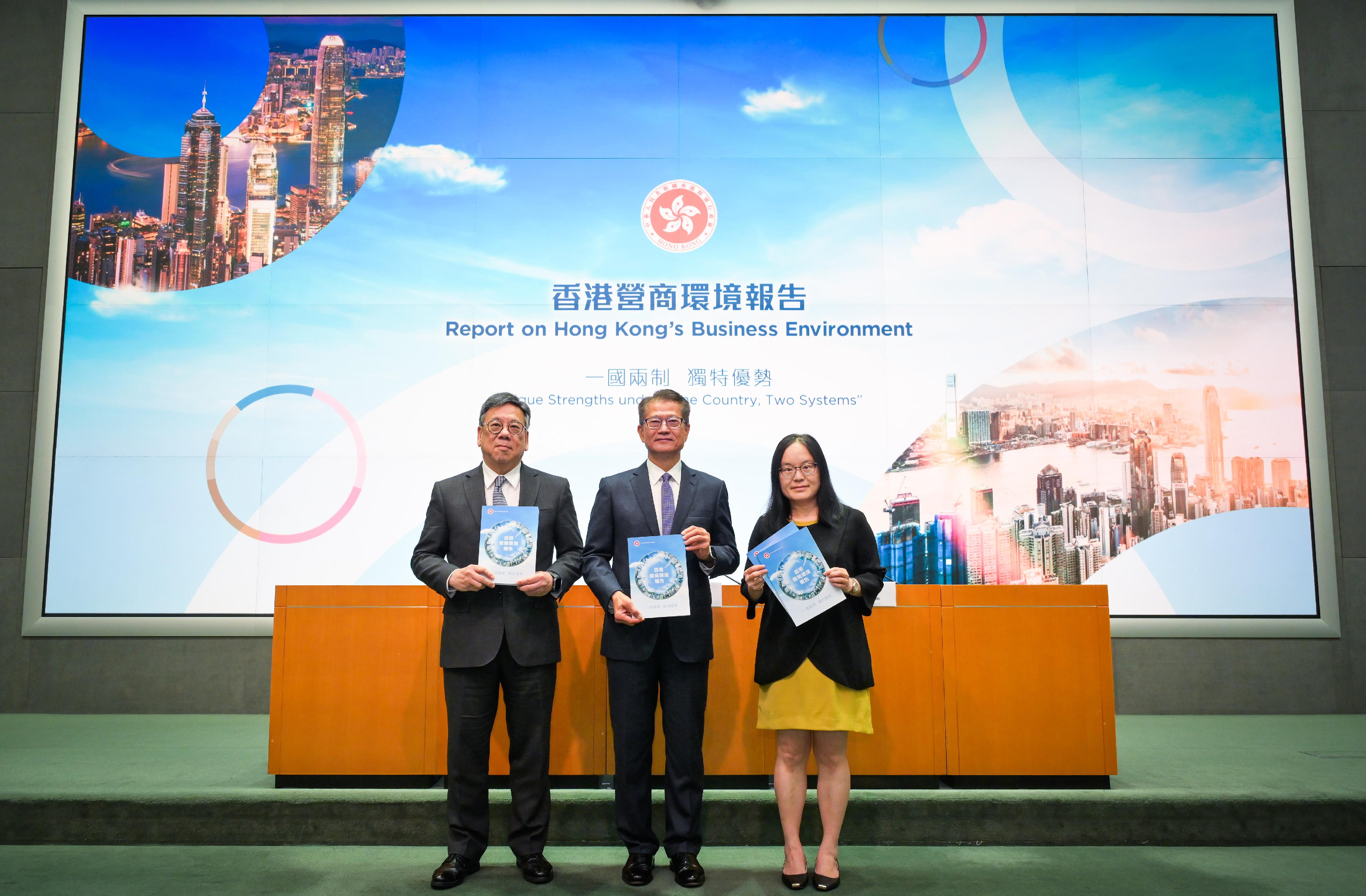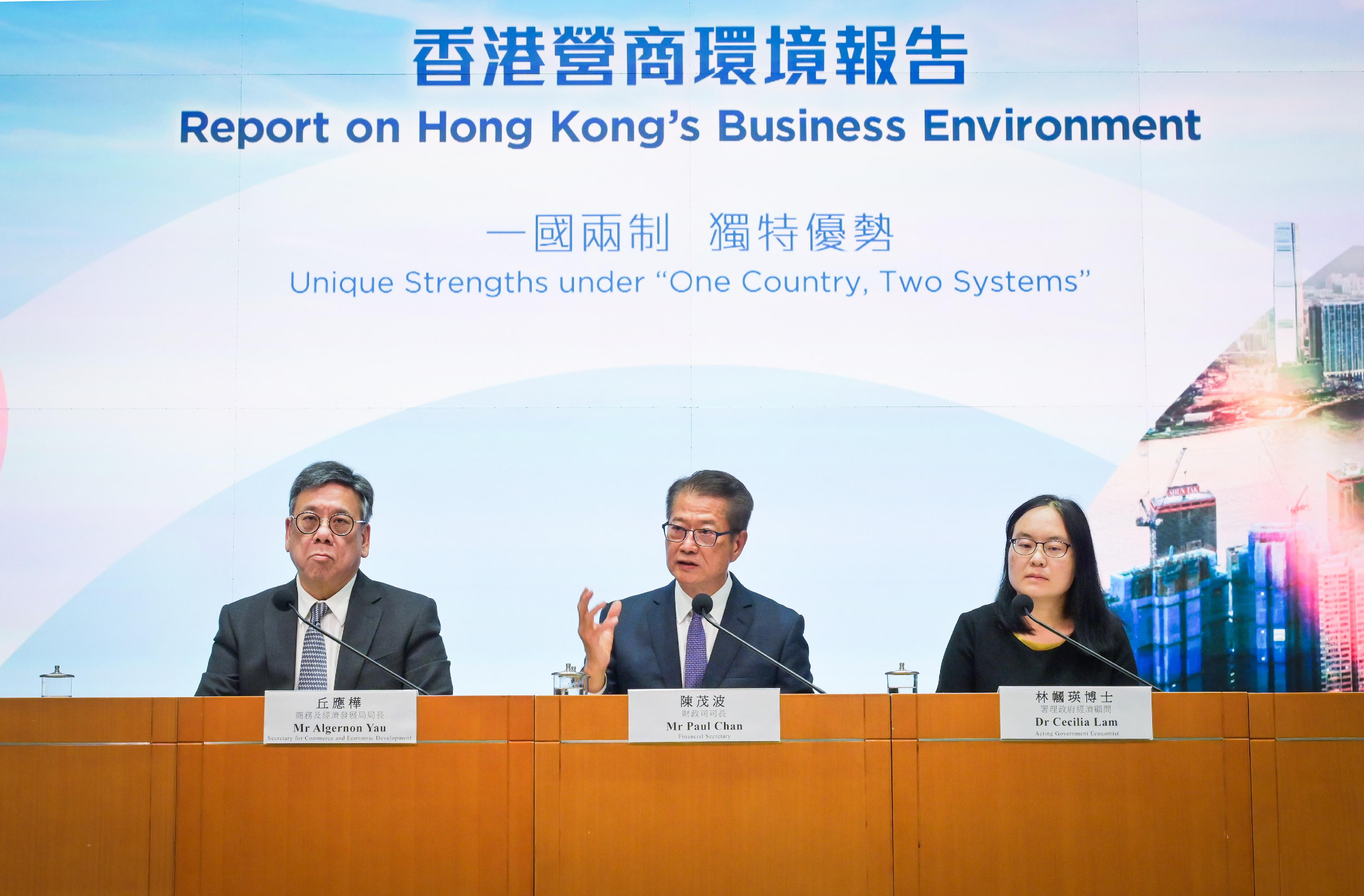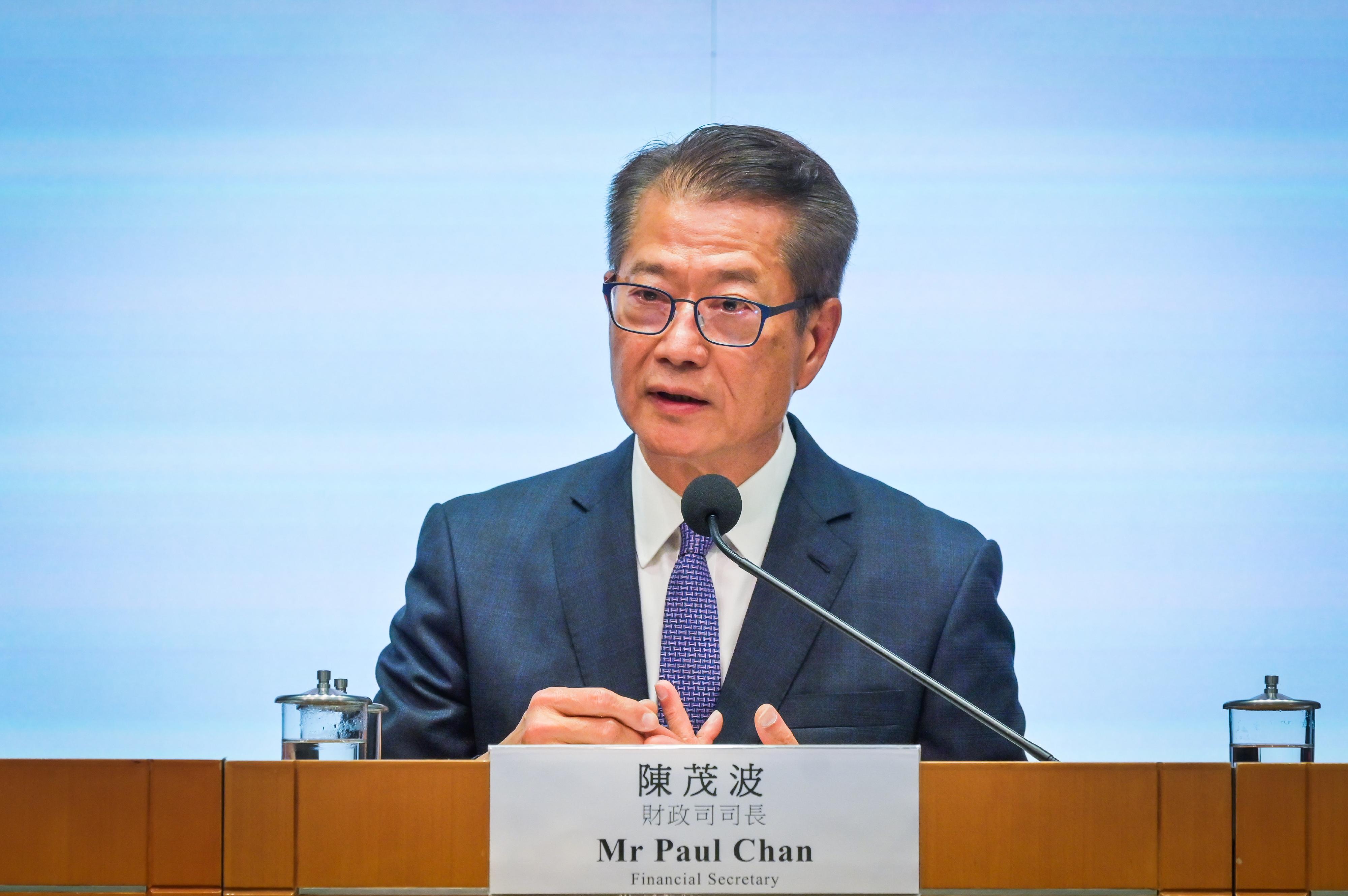Remarks at press conference on "Report on Hong Kong's Business Environment: Unique Strengths under 'One Country, Two Systems'" (with photos/video)
******************************************************************************************
Reporter: I have some questions. First of all, this report seems that it is a wrapping up of all the measures over the past few years. So, what is the significance of this report to Hong Kong's future development? Also, amid the rising challenges such as the tariff increases, how are you going to convince foreign chambers or investors to invest in Hong Kong? The last question is about the reports of the developer of 11 Skies of the Airport City project, with some reports saying that the developer has intended to sell this mega project, because of lack of tenants and also lacklustre prospects. So what is your take on the proposal of selling 11 Skies to other parties? Thank you.
Financial Secretary: Thank you. First, the significance of this report. Over the past few years, because of COVID, a lot of overseas visitors didn't have the opportunity to visit Hong Kong. Given the geopolitical landscape, there has been some misperception about the situation of Hong Kong in the western world. . We are trying very hard to reach out to the international community, to explain to them what is really happening here in Hong Kong by sharing facts and data. The purpose of this report is to recap our developments in a concise report for distribution to them, and this report will be made available online, accessible to anyone who is interested.
On the question of tariffs, on the question of the China-US geopolitical tension, of course, there are challenges, for example, in terms of exports, but there are also opportunities in respect of the international financial centre status of Hong Kong. For challenges on export, the direct impact is minimal because Hong Kong is basically a service economy; we don't have much manufacturing. On the other hand, the indirect impact could be significant, because we re-export for the Mainland. But over the years, we have seen a number of trends. One of them is Mainland companies realigning their industry bases and supply chains across Southeast Asia. For exports to certain markets, such as the US, a lot of the exports come from those regions. When you look at the figures - the export figures from the Mainland to the US, or from the Mainland via Hong Kong to the US - the share of US in Mainland's total export has been declining.
From our standpoint, we are adjusting our position. In addition to doing re-export, we have shifted to provide high-value supply chain management and the related trade finance and professional services. That is our response. For opportunities, I think we should not underestimate them. Given the geopolitical landscape, it is increasingly difficult for Mainland companies to go to the US for listing. These companies, would naturally want to come to Hong Kong for listing, because by coming to Hong Kong, they can access both international and Mainland capital. This is a very interesting value proposition to them, and has been demonstrated by the figures so far this year. In fact, we have over 200 companies in the pipeline waiting for listing. But the opportunities are more than the IPO market. Say in asset and wealth management, residents in the GBA (Guangdong-Hong Kong-Macao Greater Bay Area) are interested in having certain assets allocated offshore. Naturally, Hong Kong is the destination. The recent improvement in February last year to the GBA Wealth Management Connect - with the implementation of those measures, we have seen significant inflow of capital from the GBA into Hong Kong. In addition, we also have observed capital flow from the Middle East and ASEAN in the asset and wealth management sector. We are quite confident that, by the year 2027 and 2028 the latest - we will overtake Switzerland in cross-border wealth management.
Another dimension is Hong Kong's role as a "super connector" and "super value-adder" under the current geopolitical situation. We have observed Mainland companies' keen interest to go global. First, this is national policy, i.e. high-level two-way opening up. Second, there is also a need, because these companies want to utilise the production capacity they have and do more exports. What we have been pitching to them is that the best way to do it is to come to Hong Kong, set up a company, use Hong Kong as a platform as well as a brand to go overseas. In our experience in engaging the Middle East and ASEAN, the value of the "Hong Kong brand" is very much respected. This is one way in which we can help them. In the process, Our professional services and other service providers will benefit.
Finally, on 11 Skies, I won't comment on individual projects. But overall, the attitude of the Government is that, given the economic transition, and given the challenges currently in the non-domestic property market, banks should be supportive to their clients and help them ride through challenges. In the Hong Kong Monetary Authority, HKMA, a working group has been set up between the Hong Kong Association of Banks and the HKMA. This working group deals with individual cases with a view to helping the communication between the banks and borrowers, so that the lenders can extend a more accommodative and facilitative approach to help borrowers who have a viable business model and have a genuine interest in carrying on their business, but are just facing a liquidity crunch. That is the overall attitude of the Government. Thank you.
Reporter: Hi Mr Chan. So, I just want to follow up on the previous question first. So what's the significance of issuing the report now, like after the previous issuance of four years ago? Like, why does the Government choose to issue the new report at present? And also, you mentioned a lot of positive signs in the markets, like the stock markets booming, and Hong Kong also saw a record capital inflows in the first half of the year. So why does the Government still remain quite conservative over an uptick of the annual GDP (Gross Domestic Product) growth target for the whole year? And also, how do you see the sustainability of such momentum moving forward? And second question I also want to ask about four sectors that are facing structural changes, like you mentioned, to the retail and catering. Do you see the need to further enhance the support measures besides helping them achieve digital transformation? And finally, about the tariff truce, so the Chinese and US (United States) officials just reached agreements to extend their tariff suspension. So how do you assess the impacts on local business, and would the Government take any steps to help, perhaps exports or local businesses to take this opportunity? Thank you.
Financial Secretary: Thank you. Well, the last report was published in 2021. Over the past few years, because of COVID, a lot of overseas travellers hadn't come to Hong Kong. Given the geopolitical landscape, the perception about Hong Kong in the Western world is not entirely factual and correct. There are some misconceptions. So the purpose of this report is to show to them the current situation in Hong Kong, so that they will be able to better understand what is happening in this city. If they are interested, they are welcome to visit us to see for themselves what it is really like here and the tremendous opportunities available.
As regards the question about the GDP estimate for the whole year, the GDP growth for the first half of this year has been positive. For the first quarter, the growth was 3.1 per cent; for the second quarter, we have maintained the momentum. But given the geopolitical landscape, there are enormous uncertainty and volatility. At this stage, we think it would be prudent to keep the current GDP estimate. There is in fact a mechanism, a defined timetable for reviewing the GDP estimate regularly. On a published timeline, the Government Economist will share with the community the economic situation, and determine at that time whether to make any revision. It's better to follow that established practice as it provides certainty to the market.
As to supporting the retail and catering sector, we will keep an open mind. I have elaborated on the situation and how we have been trying to help, but we will continue to closely monitor the situation and if necessary, roll out measures. At this stage, we think the current support measures should stay. Let us observe for a longer time. We have been providing various support measures such as the BUD Fund (Dedicated Fund on Branding, Upgrading and Domestic Sales) for marketing development and e-commerce. Algernon would share more about that.
Before passing to Algernon, I would say the recent discussions leading to the temporary suspension of tariff rise is, of course, a positive sign. But on the other hand, we are conscious of the fact that things can change overnight. There is still tremendous uncertainty, and consequently, volatility. So for our work, first, we need to ensure financial stability and financial security. On the other hand, stay on course, focus on what we have set out to do, and be persistent with our efforts. That includes reinforcing our relationship with traditional markets like Europe and the US, and at the same time, opening up new markets and new capital sources from the Middle East and Southeast Asia. Thank you, Algernon please.
Secretary for Commerce and Economic Development: Regarding the challenges facing the retail and food and beverage sectors, we have different measures and funding helping the retail sector, such as the BUD Fund. We are also encouraging the sectors to look for changes and transformation, and e-commerce is one of the measures that we promote. Just today, we are going to launch the Hong Kong Shopping Festival for cross-border e-commerce to allow the retail sector to do more e-commerce business. For the maximum cumulative funding of $7 million per enterprise under the BUD Fund, they can apply for $1 million for e-commerce business to arrange for promotion and advertising for e-commerce business across the border.
There are also measures to encourage tourists to come to Hong Kong. Actually, the number of tourists coming to Hong Kong is increasing. It is a positive sign that would help the retail sector. But most importantly, as mentioned by the Financial Secretary, it is time for transformation. We have to look at customer behaviour and their needs, and how we can satisfy customer demand. It is one of the major issues that we have to jointly resolve with enterprises. I have met with different chambers and associations of the retail sector. We had very good discussions on helping them to tackle the challenging situation. As mentioned by the Financial Secretary, we will keep an open mind to look at the situation and to see whether there is a need to introduce further measures to help the retail and food and beverage sectors. Thank you.
Financial Secretary: We should be very confident in Hong Kong's attractiveness as a hub for foreign businesses and talent. Over the past few years, I've been travelling a lot and also heavily engaged with the foreign business community in Hong Kong. I can summarise three key reasons why people should choose Hong Kong. First is, of course, for business reasons. Hong Kong has the proximity and sometimes priority access to the Mainland market. Depending on which sector you are in – if you are in the tech sector, say in the biotech sector, Hong Kong has an additional advantage because of our proximity to Shenzhen, and we are part of the GBA (Guangdong-Hong Kong-Macao Greater Bay Area) which is a technology hub. The Shenzhen-Hong Kong-Guangzhou cluster is very competitive in innovation.
Apart from that, it is the capital market and the full range of funding options available here. For companies at different development stages, whether they are start-ups or others, we welcome them. In Hong Kong, we have around 4,700 start-ups, and the number represents a significant increase compared to that a few years ago. About 20 per cent of their founders come from overseas, and they come here for funding, professional advice, mentoring, and opportunities. In my discussions with the start-ups in Hong Kong Science Park and Cyberport, they value these as well as the innovation ecosystem very much. For start-ups, what they need are application scenarios, professional advice and funding support, and they are all available here. In Hong Kong, we have set up the Hong Kong Investment Corporation Limited, which provides patient capital. This means that if enterprises are engaged in cutting-edge technologies, we are willing to support them from small, and help them grow and connect them with fund managers to raise funds.
The second reason is for their families and children. It is well recognised Hong Kong's law and order is excellent. We are a very safe city. Education here is also outstanding. Moreover, this is an open and multicultural society, and it is very free. We have gathered a lot of overseas professionals and foreign businessmen here.
Finally, it is about our lifestyle. Whether it is city life, F&B (food and beverage) or our countryside. So with all these, I think if we play our cards right, Hong Kong's opportunities in the future are tremendous. Thank you for attending this conference. I appreciate your time. Thank you.
(Please also refer to the Chinese portion of the remarks.)
Ends/Wednesday, July 30, 2025
Issued at HKT 20:40
Issued at HKT 20:40
NNNN
Photo
Audio / Video
Press conference on "Report on Hong Kong's Business Environment: Unique Strengths under 'One Country, Two Systems'"







